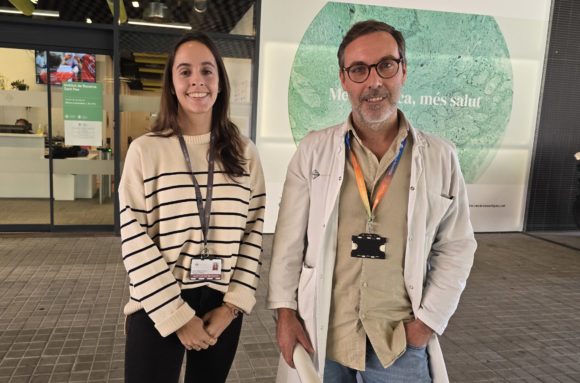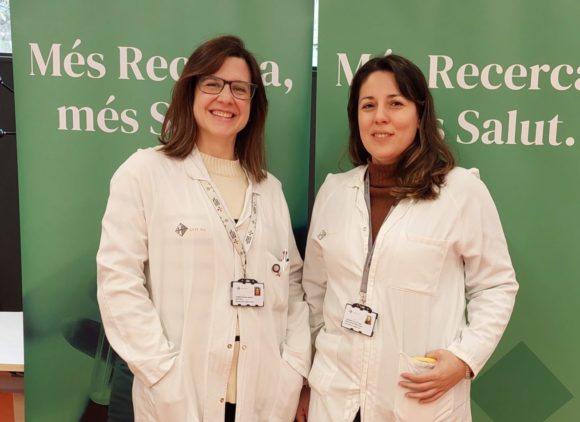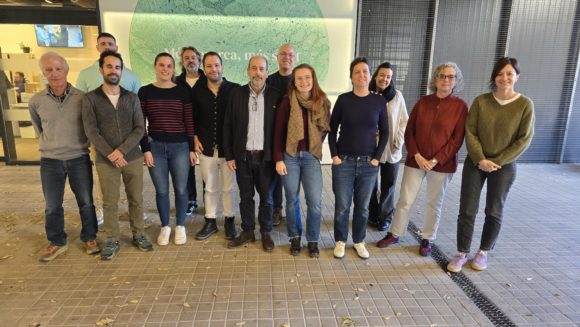
The Sant Pau Research Institute (IR Sant Pau) will celebrate the upcoming Sunday, February 15, 2026, from 11:00 a.m. to 4:00 p.m., the 2nd edition of the Women and Girls in Science Festival at the Panoramic Area of Tibidabo Amusement Park. The event is part of the educational and outreach project Mariona Investigadora and is organized on the occasion of the International Day of Women and Girls in Science. The aim is to foster scientific vocations from an early age and highlight the role of women in research and medicine. To take part in the scientific workshops, prior registration will be required through the event website: https://www.santpau.cat/es/web/public/mariona-investigadora.

A team from the Parkinson’s Disease and Movement Disorders Group at the Institut de Recerca Sant Pau (IR Sant Pau) and the Neurology Department of Hospital de Sant Pau has described in detail, for the first time, how visual perception is altered in people with Parkinson’s disease who experience hallucinations.

The Institute for Research Sant Pau (IR Sant Pau) has held a new edition of its Research Day, an annual event that consolidates the center as a leading reference in biomedical research and innovation at the service of health. The event, held in the auditorium of Hospital de Sant Pau, brought together researchers, healthcare professionals, institutional representatives, and experts from the research system to reflect on the major challenges and opportunities of hospital-based research.

The Institut de Recerca Sant Pau (IR Sant Pau) has led a multicenter study showing that incorporating the biomarker NT-proBNP, commonly used to assess cardiac function, significantly improves the ability of the angiogenic sFlt-1/PlGF ratio to predict preeclampsia in the short term. The study, published in Clinical Chemistry, demonstrates that integrating both biomarkers makes it possible to refine risk stratification in women with clinical suspicion of the disease.
Preeclampsia affects between 2% and 5% of pregnancies and is one of the leading causes of maternal–fetal morbidity worldwide. The sFlt-1/PlGF ratio allows the disease to be ruled out when values are below 38, but above 38 its interpretation becomes less conclusive and requires close follow-up and additional assessments. The main challenge lies in managing cases with an sFlt-1/PlGF ratio between 38 and 84, where diagnostic and management uncertainty is greatest. As explained by Dr. Carmen Garrido, clinical head of Obstetrics at Hospital Sant Pau and collaborating researcher in the Perinatal and Women’s Medicine group at IR Sant Pau, “It is in this intermediate diagnostic range where NT-proBNP provides an additional answer that allows us to guide both the case and follow-up much more effectively.
To assess the added value of NT-proBNP, the team developed three predictive models based on different thresholds of the angiogenic ratio. The first re-evaluated cases with values above 38 by incorporating the cardiac biomarker. The second examined its usefulness at values above 85, traditionally associated with higher clinical risk. The third focused exclusively on the 38–84 range, an interval that is particularly complex from a diagnostic standpoint. This last model showed the most robust performance, as it made it possible to better discriminate between patients who would progress to preeclampsia and those who would not, improving short-term prediction of the disease.
According to Dr. Carmen Garrido, “These models allowed us to clearly identify the situations in which NT-proBNP provides decisive information, especially when the angiogenic ratio alone does not resolve the diagnostic uncertainty.”
To determine the clinical applicability of these models, the study assessed their performance across different clinical scenarios of preeclampsia: early-onset (before 34 weeks), preterm (before 37 weeks), term (after 37 weeks), and cases with maternal or fetal complications. This approach made it possible to verify whether the benefit of combining markers was maintained across all contexts or was particularly notable in specific profiles. According to Dr. Madalina Nicoleta Nan, staff biochemist at Hospital Sant Pau and researcher in the Perinatal and Women’s Medicine group, “Stratification by clinical scenario allowed us to confirm that combining NT-proBNP with the angiogenic ratio is especially valuable in predicting early-onset preeclampsia and higher-risk forms, where disease progression can accelerate in a very short time.”
The study, conducted in 316 women with clinical suspicion of preeclampsia and based on the analysis of 424 samples, shows that NT-proBNP levels are significantly elevated in those who will develop preeclampsia within the following seven days. Integrating this biomarker with the angiogenic ratio maintains a negative predictive value of 99.5%, while improving the positive predictive value. This increases from 35.4% when using the sFlt-1/PlGF ratio alone to 60.7% for predicting early-onset preeclampsia one week before the appearance of clinical manifestations. This combination provides high reliability for ruling out the disease in the short term and makes it possible to prioritize surveillance for cases that are truly likely to progress.
In addition, the combination adds a complementary pathophysiological dimension: the angiogenic ratio reflects placental dysfunction, while NT-proBNP provides information on the degree of maternal cardiovascular stress, a factor closely linked to the risk of clinical deterioration. “Combining markers that inform on different processes,” explains Dr. Garrido, “helps us more precisely identify the patients who need intensified follow-up and avoid unnecessary interventions in those who do not.”
The usefulness of NT-proBNP is particularly evident in cases where the angiogenic ratio shows intermediate values and its diagnostic capacity is more limited. As detailed by Dr. Garrido, “NT-proBNP allows us to distinguish whether we are dealing with a patient at real risk of progression or whether a less intensive monitoring approach can be considered,” information that is essential for tailoring clinical decisions more accurately.
The analysis carried out in the study reveals that combining both biomarkers also makes it possible to anticipate complications and predict short-term clinical evolution. Women with abnormal values in both markers show a mean latency to delivery of 1.3 weeks, indicating closer proximity to decompensation and the need to intensify surveillance and prepare interventions in advance.
As highlighted by Dr. Madalina Nicoleta Nan, “When both markers are elevated, progression toward the need to end the pregnancy is usually faster, and having this information allows us to plan care more effectively.” Conversely, she adds, “If the angiogenic ratio is high but NT-proBNP remains low, this usually reflects placental alteration that does not imply preeclampsia requiring imminent delivery, allowing us to avoid hasty interventions.”
The research team emphasizes that NT-proBNP does not replace the angiogenic ratio but rather complements it by providing relevant clinical information in cases where sFlt-1/PlGF is inconclusive. This complementarity facilitates more precise decision-making, allows follow-up to be tailored according to risk profile, and offers a high-value tool for clinical practice. In addition, NT-proBNP is an accessible, low-cost, and widely available test, which would facilitate its incorporation into care protocols.
Although the results need to be validated in larger and more diverse cohorts, they represent a significant advance in the early prediction of preeclampsia and open the door to multimarker diagnostic strategies with greater precision and real-world applicability. IR Sant Pau thus consolidates its leadership in perinatal research and in the development of diagnostic tools aimed at safer and more personalized care.
Garrido-Giménez C, Nan MN, Cruz-Lemini M, García-Manau P, Garcia-Osuna Á, Ullmo J, Mora J, Sánchez-García O, Medina-Mallén MDC, Chóliz M, Platero J, Llurba E, EuroPE Working Group. Can NT-proBNP enhance the accuracy of angiogenic factors in the short-term prediction of preeclampsia? Clin Chem 2025;72:206–16. https://doi.org/10.1093/clinchem/hvaf135

A multidisciplinary team has uncovered a key mechanism that allows the human bacterium Mycoplasma pneumoniae—responsible for atypical pneumonia and other respiratory infections—to obtain cholesterol and other essential lipids directly from the human body. The discovery has been published in Nature Communications.